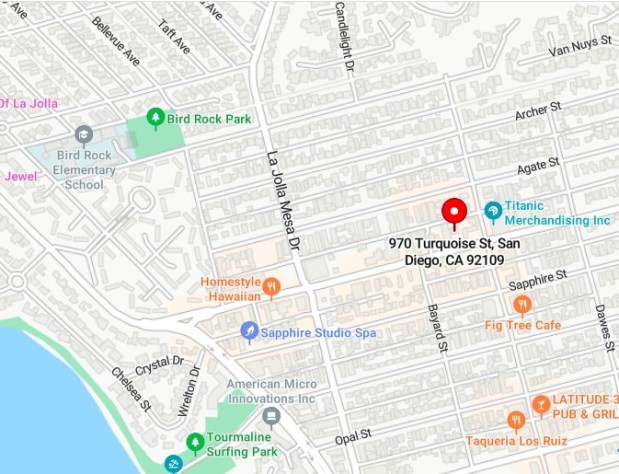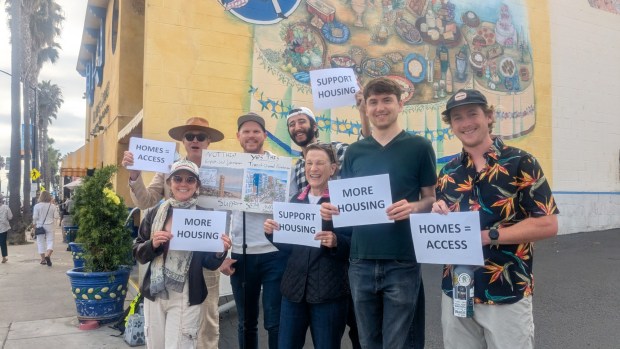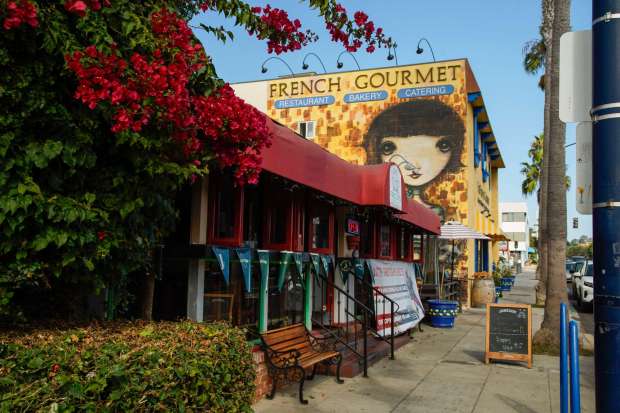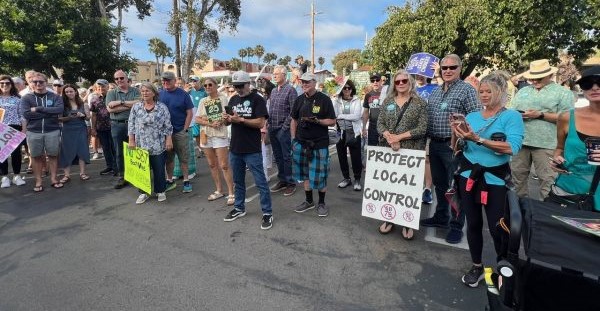Though the proposed development of a 239-foot-tall residential and commercial structure on Turquoise Street in north Pacific Beach hasn’t yielded significant updates recently, it remains the subject of much public discussion.
Though most of it has been in opposition, opinions on dense developments like the 213-unit, 22-story building proposed for 970 Turquoise aren’t monolithic.
The dichotomy between wanting more homes for San Diegans and trepidation about bypassing local ordinances and disrupting community character was on display July 19 as two separate groups hit the streets in Pacific Beach at almost the same time to voice their perspectives about the planned tower and a state housing bill.
Setting the stakes
Kalonymus LLC filed a permit application with the San Diego Development Services Department last August for the $185 million Turquoise Street project. Ten of the residential units are designated for very-low- to middle-income households. A large portion, 139 units, is described as visitor accommodations, or hotel rooms, though developers have said they plan to use the units as market-rate apartments. The plan also includes ground-floor shops and 311 parking spaces.
 The proposed Turquoise Street development would be placed near the border of La Jolla’s Bird Rock neighborhood. (Bing Maps and La Jolla Light)
The proposed Turquoise Street development would be placed near the border of La Jolla’s Bird Rock neighborhood. (Bing Maps and La Jolla Light)
The project, which is being reviewed by Development Services, would bypass the city’s voter-approved Proposition D, which generally limits the height of new buildings to 30 feet in coastal areas west of Interstate 5. It would do that through a state density bonus law that supersedes local voter initiatives and planning rules. The law allows developers to add to their buildings for including certain quantities of housing considered affordable for lower-income residents.
Kalonymus — a real estate investment and development firm that’s active in the San Francisco, Los Angeles, Central Coast and Miami markets — says the Turquoise Street development would “truly move the needle” in meeting San Diego’s need for homes.
Because it would avoid the 53-year-old coastal height limit, the proposal has sent waves of shock and anger through area communities, including La Jolla, where the southern boundary is a few blocks from the development site.
Meanwhile, California Senate Bill 79 would allow increased construction of multifamily homes near public transit such as rail stations and bus lines and allow some projects to bypass local regulations.
The La Jolla Shores Association voted July 16 to write a letter opposing the bill, which was approved by the state Senate on June 3 and is making its way through the Assembly. LJSA contends the measure doesn’t account for community context, local topography, infrastructure limitations and quality of architectural design.
The letter was to be sent to members of the Assembly and Senate, as well as San Diego Mayor Todd Gloria and City Council President Joe LaCava.
State Sen. Catherine Blakespear (D-Encinitas), whose 38th District includes La Jolla and Pacific Beach, was one of 13 senators who voted against the bill when it passed the Senate.
LaCava, whose District 1 also includes La Jolla and PB, does not support the bill, according to representative Joaquin Quintero.
LaCava and Gloria have voiced opposition to the Pacific Beach proposal, as has U.S. Rep. Scott Peters (D-La Jolla).
Though the state Department of Housing and Community Development has said the state density bonus law can supersede local restrictions, in the Turquoise case HCD sent a “technical assistance” letter in December saying the city of San Diego could deny the project “by making a written finding, based on substantial evidence, that the [density bonus] incentive does not result in identifiable and actual cost reductions to provide for affordable housing.”
In other words, the city must prove that some or all of the developer’s requested bonuses, waivers and incentives are not necessary to create the project’s 10 affordable housing units.
Opposing the high-rise
A July 19 rally organized by local advocacy group Neighbors for a Better California targeted what it calls the “Turquoise Tower” with a crowd the group estimated at 500 people.
It was the group’s latest and largest protest against the development. Participants heard speakers voice their concerns about the project and then marched to the proposed site outside The French Gourmet restaurant.
La Jolla resident Trudy Grundland, one of several outspoken opponents of the development, has used social media and word of mouth to encourage locals to sign petitions against the project and contact their legislative representatives with their concerns.
Grundland told the crowd that the tower is an unfair application of state law and that such developments will “forever mess up the area” and set a bad precedent for other coastal communities.
Karen Ventimiglia, who helped organize the rally, lives in the La Jolla Mesa Drive area not far from the proposed site and said she’s especially concerned about blocked views, traffic congestion, complications from construction and potential effects on emergency routes.
SB 79 could make matters worse and strip away local control, she added.
Ventimiglia described the rally as “a true grassroots event” with no hired help or corporate sponsors.
“What stood out most was the unity,” she said. “It wasn’t just a protest, it was neighbors coming together with purpose. People kept saying it felt like a local groundswell — everyone there was ready to defend what makes our coastal neighborhoods worth fighting for.”
Hoping for ‘common ground’
Just 30 minutes before, a coalition of housing advocates held a news conference and rally at the development site.
Their event, featuring 15 “core” participants, focused on SB 79, which they describe as “a critical step forward.”
Harry Bubbins, lead organizer of local advocacy group Respect Bird Rock and a board member of the La Jolla Community Planning Association, said he helped coordinate the rally to emphasize the importance of transit-oriented developments in providing needed housing.
“We need diverse housing options — not just luxury homes with four-car garages — to ensure families of all income levels can afford to live in coastal communities like Pacific Beach and La Jolla,” Bubbins told the La Jolla Light. “Multi-unit housing near transit reduces traffic, supports sustainability and creates more inclusive neighborhoods.”
 A group of housing advocates gathers July 19 on Turquoise Street in Pacific Beach to promote construction of more multi-unit housing near public transit. (Respect Bird Rock)
A group of housing advocates gathers July 19 on Turquoise Street in Pacific Beach to promote construction of more multi-unit housing near public transit. (Respect Bird Rock)
Bubbins added that the scheduling of the event was intentional, believing it would set the tone for a productive conversation about housing solutions. Other discussion points included what the advocates see as a need to decouple parking mandates from housing and attract a wider swath of coastal residents.
“Telling people to move to East County if they want opportunity is not only dismissive but undermines the inclusive, forward-thinking vision our community deserves,” Bubbins said.
“This [Turquoise Street] development proposal, while bold, serves as an important starting point to address concerns and find common ground. Our rally demonstrated that there’s broad support for multi-unit housing, even if a vocal minority, often already homeowners, tries to drown out the discussion with fear and exclusionary rhetoric.”
La Jollan Catharine Douglass, who participated in the Neighbors for a Better California rally, said “Everybody wants to label [people] a YIMBY [Yes in My Backyard] or a NIMBY [Not in My Backyard]. There’s a lot of in between. It depends on what the project is.”
Matt Awbrey, a spokesman for Kalonymus, told the Light that the company was aware of both rallies.
Of the one presented by the housing advocates, he said “we appreciate this organic, grassroots support for more housing in all San Diego communities, including this one.”
Turning up the heat
The French Gourmet has felt the impact of the Turquoise Street plan in various ways. Not only would it replace the popular restaurant and some other nearby businesses, but owner Michel Malecot says The French Gourmet has been the target of a “silent” community boycott since he sold its property to the developer early this year.
 This area on Turquoise Street in north Pacific Beach, including The French Gourmet restaurant, is planned for a 22-story mixed-use building. (Alejandro Tamayo / The San Diego Union-Tribune)
This area on Turquoise Street in north Pacific Beach, including The French Gourmet restaurant, is planned for a 22-story mixed-use building. (Alejandro Tamayo / The San Diego Union-Tribune)
In an emailed statement to customers this month, Malecot — The French Gourmet’s owner for more than 45 years — said the first five months of 2025 were a “financial disaster” for the restaurant, leading him to deplete his personal resources to keep it running after he had announced he would keep it open through the end of the year.
While he understands the community’s frustration with the potential development, the boycott could force him to close earlier than anticipated, he said in the email.
Malecot previously told the Light that he and Kalonymus opened discussions in March 2023 as he was looking toward retirement. Soon after, he said, he received a “substantial offer” to buy the building.
Malecot said he had “no idea” at the time what the size and scale of Kalonymus’ project would be and that he does not approve of the plan. But he said Kalonymus has “done everything they need to do” to acquire the property.
More legislation
Discussion is continuing on proposed legislation that would address what some lawmakers see as “loopholes” exposed by the Turquoise proposal.
In January, Blakespear introduced Senate Bill 92, which is intended to amend the density bonus law to help prevent similar projects in the future.
SB 92 would “ensure the density bonus law is being used how it was originally intended — to encourage developers to add significant affordable housing to their mixed-use projects,” Blakespear said when she introduced the bill.
Neighbors for a Better California has noted that the Pacific Beach plan includes only five units deemed affordable for very low incomes.
However, Ventimiglia said in January that “disappointingly, SB 92 doesn’t require higher percentages of affordable housing. It focuses on housing overall but lacks stricter affordability rules.”
The state Senate passed SB 92 on May 28 and it is now being considered in the Assembly.
Much of the worry in La Jolla surrounds precedent.
“If this [Turquoise project] gets passed, it’s going to be just the start of changing the whole scope of Pacific Beach and probably La Jolla at some point, too,” said Barbara Leinenweber, a La Jolla resident and real estate agent who attended the July 19 rally organized by Neighbors for a Better California.
“If it’s here, then who’s not to say it’s going to start these developers, with their loopholes, from trying to do these things in Bird Rock, Windansea or The Village?” ♦
